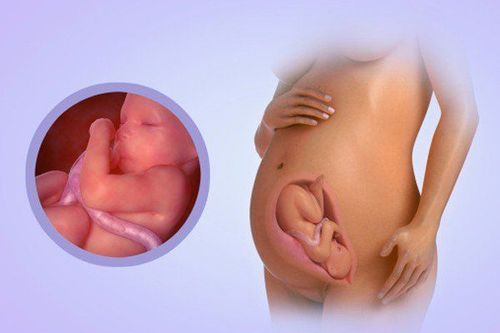This is an automatically translated article.
The article is professionally consulted by Master, Doctor Nguyen Van Thanh - Department of Obstetrics and Gynecology - Vinmec Ha Long International Hospital.
Weight for each week of age is one of the criteria to evaluate the health and development of the fetus. The weight of the fetus in the last 3 months usually increases more strongly to prepare for the birth process.
1. Factors affecting fetal weight
The weight of the fetus in the last 3 months (the period from week 26 to week 40 of pregnancy) often increases rapidlyGenetic factors. Mother's body shape and weight before pregnancy: Every pregnant woman has a different pre-pregnancy weight, so how much weight the baby gains in the last three months will also be slightly different. Maternal nutrition: If the mother's nutrition is adequate, the fetus will have a reasonable weight, and if the mother's nutrition is poor, the fetus will also be deficient in nutrients and underweight. Gain enough weight during pregnancy: Pregnant women need to gain enough weight during pregnancy. If the mother gains too little weight or does not gain weight, it is likely that the baby will be born underweight and vice versa Number of fetuses: In the case of a mother carrying twins or multiples, the weight of each baby is usually lighter than normal Pathology of the fetus Women: Being overweight, obese or having gestational diabetes can affect your baby's weight. Age of the pregnant mother.

2. Weight of the fetus in the last 3 months
Fetal weight and length will be measured according to each developmental stage as follows:Before 20 weeks of age, the fetus usually curls up in the mother's womb. At this point, your baby's length will be measured from head to rump – aka rump length. From the 30th week of pregnancy, the 30-week fetal weight will accelerate to the maximum to prepare for birth. Below is a table of fetal weight and length in the last 3 months according to gestational weeks for reference (updated in 2019 - World Health Organization WHO):
| Cân Nặng Thai Nhi Tuần thứ 24 | 30 cm | 600 g |
| Cân Nặng Thai Nhi Tuần thứ 25 | 34.6 cm | 660 g |
| Cân Nặng Thai Nhi Tuần thứ 26 | 35.6 cm | 760 g |
| Cân Nặng Thai Nhi Tuần thứ 27 | 36.6 cm | 875 g |
| Cân Nặng Thai Nhi Tuần thứ 28 | 37.6 cm | 1005 g |
| Cân Nặng Thai Nhi Tuần thứ 29 | 38.6 cm | 1153 g |
| Cân Nặng Thai Nhi Tuần thứ 30 | 39.9 cm | 1319 g |
| Cân Nặng Thai Nhi Tuần thứ 31 | 41.1 cm | 1502 g |
| Cân Nặng Thai Nhi Tuần thứ 32 | 42.4 cm | 1702 g |
| Cân Nặng Thai Nhi Tuần thứ 33 | 43.7 cm | 1918 g |
| Cân Nặng Thai Nhi Tuần thứ 34 | 45 cm | 2146 g |
| Cân Nặng Thai Nhi Tuần thứ 35 | 46.2 cm | 2383 g |
| Cân Nặng Thai Nhi Tuần 36 | 47.4 cm | 2622 g |
| Cân Nặng Thai Nhi Tuần thứ 37 | 48.6 cm | 2859 g |
| Cân Nặng Thai Nhi Tuần thứ 38 | 49.8 cm | 3083 g |
| Cân Nặng Thai Nhi Tuần thứ 39 | 50.7 cm | 3288 g |
| Cân Nặng Thai Nhi Tuần thứ 40 | 51.2 cm | 3462 g |
Trắc nghiệm: Khi thai nhi 32 tuần, mẹ cần chú ý gì?
Khi bước vào tuần thứ 32 của thai kỳ, thai nhi sẽ có bước phát triển vượt trội và dẫn đến những thay đổi về mọi mặt trong cơ thể mẹ. Vậy hãy cùng tìm hiểu xem khi thai 32 tuần chúng ta cần lưu ý những gì qua bài trắc nghiệm sau đây nhé.3. Is overweight or underweight fetus dangerous?
Overweight fetus
A baby that is overweight and too large can make delivery difficult and damage the mother's genital tract, even causing uterine rupture during labor.
Babies born overweight will face the risk of hypoglycemia (because the mother's insulin levels are high, after birth, they are lowered, while the infant's endocrine system cannot adjust in time). This leads to a series of phenomena such as respiratory failure, circulatory failure, heart failure, hypothermia... in children.
Low birth weight baby
If the fetus is underweight for a long time, the baby during birth is often at high risk of suffocation. In addition, due to poor resistance, the baby is very susceptible to other diseases such as: pneumonia, polycythemia vera, hypoglycemia...
Some scientists also believe that low birth weight children are also at risk. The risk of later intellectual decline, IQ and coordination index - movement are lower than those of children with enough weight.
Table of fetal length and weight in the third trimester is valid for reference. However, there are many factors that cause a baby's weight to vary slightly. Therefore, if the weight of the fetus is high or low compared to the general standards, pregnant women should consult an obstetrician, not rush to conclusions.

4. What effect does the mother's weight and nutrition have on the fetus?
Pregnant women should adjust their nutrition, so that the weight gain about 10-12 kg during pregnancy is the best.If the fetus is underweight compared to the norm: The mother must gain about 2.5 kg. If the mother is overweight: Only about 1kg should be gained from the 14th to the 28th week of pregnancy, pregnant women can gain about 0.5 kg per week is appropriate. During pregnancy, nutrition for pregnant women is very important. If the pregnant mother gains too little, it means that there will not be enough nutrients to provide for the developing fetus, the baby is at risk of premature birth. In contrast, mothers who gain too much weight during pregnancy will have an increased risk of gestational diabetes, a higher chance of having a cesarean section because the baby is too large.
In the last 3 months of pregnancy, the fetus has a strong growth in weight, but this weight problem will directly affect the baby's health. Underweight or overweight babies cause a variety of complications such as: respiratory failure, heart failure, polycythemia vera, pneumonia, hypoglycemia... Therefore, mothers should have regular antenatal check-ups during this period to monitor the weight of the fetus, thereby making appropriate adjustments in nutrition.
To protect the health of the mother and baby comprehensively as well as help the mother feel more secure during labor, Vinmec provides a package Maternity service. With this package, the mother will have regular antenatal check-ups and routine tests to monitor her health. The fetus is monitored for fetal heart rate and uterine contractions by obstetric monitor at 37-40 weeks of expected time of delivery. If the baby is born prematurely, they will be cared for and raised with international standards. Premature births are organized in a methodical manner under the coordination of many specialties: obstetrics, anesthesiology, and especially neonatology and paediatrics. This helps to reduce the risks and increase the effectiveness of treatment for health problems that premature babies may have. After each antenatal check-up, pregnant women are analyzed by doctors and advised on proper nutrition and rest with the health of both mother and baby to prepare for the best health before giving birth.

Please dial HOTLINE for more information or register for an appointment HERE. Download MyVinmec app to make appointments faster and to manage your bookings easily.














